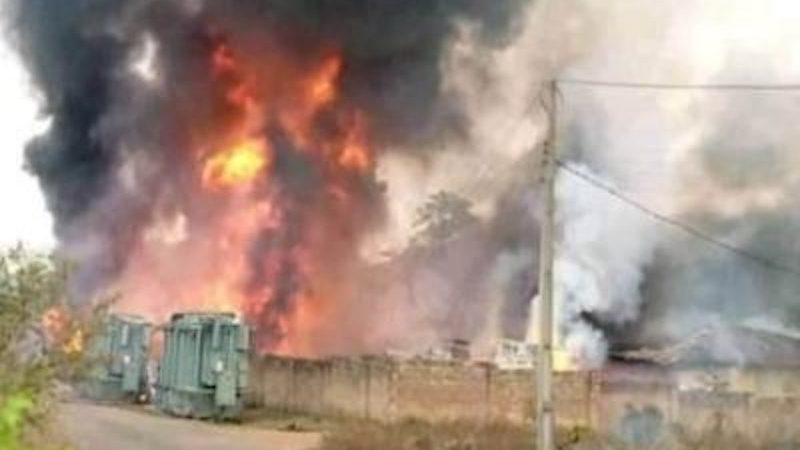Power Generation Crashes By Alarming 630MW As Fire Outbreak Forces Lagos Egbin Plant To Suspend Operation

Nigeria’s daily power generation has fallen by an alarming 630 megawatts (MW) since Wednesday following a fire outbreak at Egbin Power Plant in Ikorodu, Lagos State and the resultant shut down of generation by the company.
This development, coupled with the load reduction mechanism adopted by the Transmission Company of Nigeria (TCN) to prevent system collapse, has worsened the power supply situation in Lagos State. Electricity consumers in the state and its environs have been witnessing constant power outages for several weeks.
Egbin Power had, in a statement issued to its stakeholders and the general public yesterday, reported the fire incident at its power plant on Wednesday, February 2, 2022, at about 4.20pm, leading to blackout in Lagos State.
The thermal plant has an installed capacity of 1,320MW consisting of six turbines of 220MW each, while its actual average generating capacity is about 800MW.
Egbin said the fire outbreak was successfully contained by a team of its firefighters in collaboration with firefighters from the Nigeria Gas Company (NGC) in Egbin.
The company said it had set out a process to determine the cause of the fire incident as it had temporarily suspended its operations in line with the plant’s safety procedures.
Egbin has since activated its emergency response mechanism to determine the cause of the incident, while operations at the plant have been temporarily suspended in line with the plant’s safety procedures. Egbin is also working with the Federal Fire Service, the Federal Ministry of Power and other stakeholders to review the incident,
the management of the power plant said in the statement.
Confirming the fire incident and its technical implications, TCN’s spokesperson, Mrs. Ndidi Mba, told Flavision yesterday that it had led to the removal of a total of 630MW from the national grid.
Mba said,
We know that there was a fire outbreak and the total generation of 630MW was removed from the grid because of that.
You know, when a fire outbreak happens, even if it doesn’t affect the entire units, the tendency is that, to protect the other ones, you shut them down.
So, as I said, 630mw was removed from the grid on that day (Wednesday).
Nigeria generates an average of 8,000mw of electricity daily, out of the installed 13,800mw capacity, transmits an average of 5,000mw, while distribution hovers between 3,000 and 2,500mw.
Meanwhile, electricity consumers in Lagos and its environs have recently been witnessing constant power outages.
The two distribution companies serving Lagos – Ikeja Electric (IE) and Eko Electricity Distribution Company (EKEDC) -attributed the outages under their networks to a drop in power generation in the country.
In a recent statement for its customers, IE blamed the power outage experienced in certain parts of its network on load shedding by the TCN as a result of a drop in power generation.
EKEDC had also attributed the reduction in supply to the drop in power generation from an average of 3,700MW to 2,000MW.
The Disco said this was caused by gas limitations arising from vandalism and more recently an issue affecting the TCN line from the Egbin Power Plant.
Explaining the constant power outages in Lagos State in recent times, the TCN spokesperson stated that the state was a high consumption area and that the agency had to reduce the load to avoid overloading 330kv lines within the state and to achieve load balance.
Meanwhile, Egbin has assured the public that its technical team is working assiduously to restore operations.
“As the foremost power plant in the nation, Egbin remains committed to providing power innovatively and responsibly in compliance with good health, safety and environmental standards,” she added.

Justin Nwosu is the founder and publisher of Flavision. His core interest is in writing unbiased news about Nigeria in particular and Africa in general. He’s a strong adherent of investigative journalism, with a bent on exposing corruption, abuse of power and societal ills.













